VIRGINIA CAROLINE DICKEY PHOTO’S
Neal Roth Williams
Aug 31, 1950-Sep 19, 2009

When I Must Leave You
By Helen Steiner Rice
When I must leave you for a little
while-
Please do not grieve and shed wild tears,
And hug your sorrow to you through the years,
but start out bravely with a gallant smile.
And for my sake and in my name,
Live on and do all things the same.
Feed not your loneliness on empty days,
but fill each waking hour in useful ways.
Reach out your hand in comfort and in cheer,
and I in turn will comfort you and hold you near.
And never, never be afraid to die,
for I am waiting for you in the sky.
Pictures are Courtesy of Neal Roth Williams
These are copies of original photos in the possession
of Neal Roth Williams and were originally the possessions of Virginia
Caroline Dickey Reynolds, the daughter of David Ballard Dickey & Nancy
A.S. Page Dickey
In November of 1996 Neal sent these pictures to Joan Severa & Leslie A.
Bellais, Curator of Costume & Textiles for the Wisconsin State
Historical Museum, for assessment, they used the factors of manner of
dress, hairstyle and other features to ascertain when the photo may have
been taken, and narrow down the time period for each photo. There is a
corresponding letter under each picture this corresponds with a letter
assigned to the picture description and appraisal.
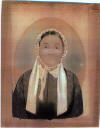 Picture B: 1850-1855; This image appears to have been redrawn,
especially the dark lines on the dress. The sleeve seams are
probably the partial diagonal lines low on the shoulder. Vertical
shoulder seams are first seen in the 1870’s. Everything else about
this image makes us believe that it is pre-Civil War. The plain
garment with wide collar, round neckline, and center front closure along
with the cap and severe center-parted hairstyle indicate an early 1850’s
date.
Picture B: 1850-1855; This image appears to have been redrawn,
especially the dark lines on the dress. The sleeve seams are
probably the partial diagonal lines low on the shoulder. Vertical
shoulder seams are first seen in the 1870’s. Everything else about
this image makes us believe that it is pre-Civil War. The plain
garment with wide collar, round neckline, and center front closure along
with the cap and severe center-parted hairstyle indicate an early 1850’s
date.
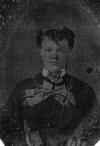 Picture C: c. 1870; The high waistline and bishop sleeves
(tight at the shoulder seam and wrist, full in between) indicate a late
1860’s garment, but the large bow, high white removable collar, and less
severe hairstyle (some curls and fullness allowed) are indicative of the
early 1870’s.
Picture C: c. 1870; The high waistline and bishop sleeves
(tight at the shoulder seam and wrist, full in between) indicate a late
1860’s garment, but the large bow, high white removable collar, and less
severe hairstyle (some curls and fullness allowed) are indicative of the
early 1870’s.
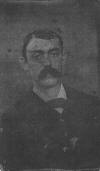 Picture F: 1890-1891; Note that the vest is now buttoned very high on
the chest and a small narrow bowtie is worn; a style worn throughout the
1880’s. The indication of the date, however, is the hairstyle
which Joan describes as a “buzz” or close cut on the sides with short
hair on the crown and a side part. According to her this was fad
of the very early 1890’s.
Picture F: 1890-1891; Note that the vest is now buttoned very high on
the chest and a small narrow bowtie is worn; a style worn throughout the
1880’s. The indication of the date, however, is the hairstyle
which Joan describes as a “buzz” or close cut on the sides with short
hair on the crown and a side part. According to her this was fad
of the very early 1890’s.
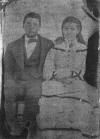 Picture G: 1873-1875; Generally it is easier to date photos by women’s
clothing, which changed fashion more frequently than men’s. This
woman is wearing a typical mid-1870’s dress, which appears to have a
longer waist than “C”, a high collar, coat sleeves (2 seams), and an
overskirt/skirt combination or at least the appearance of one.
Picture G: 1873-1875; Generally it is easier to date photos by women’s
clothing, which changed fashion more frequently than men’s. This
woman is wearing a typical mid-1870’s dress, which appears to have a
longer waist than “C”, a high collar, coat sleeves (2 seams), and an
overskirt/skirt combination or at least the appearance of one.
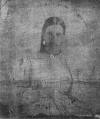 Picture H: c. 1862; Joan dated this image based on the bishop sleeves,
the round neckline, the full, possibly crinoline, skirt, and severe
hairstyle.
Picture H: c. 1862; Joan dated this image based on the bishop sleeves,
the round neckline, the full, possibly crinoline, skirt, and severe
hairstyle.
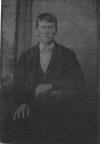 Picture J: c. 1875; This is definitely an 1870’s image, since the
man is wearing a wide-lapel frock coat shows a lot of shirt front.
These were going out of style by the late 1870’s, but would still have
been worn by the less fashionable to about 1880.
Picture J: c. 1875; This is definitely an 1870’s image, since the
man is wearing a wide-lapel frock coat shows a lot of shirt front.
These were going out of style by the late 1870’s, but would still have
been worn by the less fashionable to about 1880.
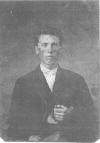 Picture K: c. 1878; Note that the lapels are narrower than the previous
image and less shirt is showing, indicating a late 1870’s date. By
1880 there would be even less shirt visible.
Picture K: c. 1878; Note that the lapels are narrower than the previous
image and less shirt is showing, indicating a late 1870’s date. By
1880 there would be even less shirt visible.
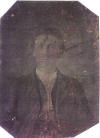 Picture L: c. 1870 This was a difficult photo to date because the man
does not appear to be wearing fashionable clothing (note the lack of
collar). Joan primarily based the date on the hairstyle which
consists of medium length hair brushed off the forehead and exposing the
ears, basically an 1860’s to early 1870’s style.
Picture L: c. 1870 This was a difficult photo to date because the man
does not appear to be wearing fashionable clothing (note the lack of
collar). Joan primarily based the date on the hairstyle which
consists of medium length hair brushed off the forehead and exposing the
ears, basically an 1860’s to early 1870’s style.
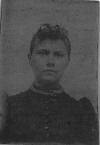 Picture M: 1890-1891; The dress the women’s wearing was only fashionable
for a brief time. Its features are the peaked sleeves, tight fit
with a center front buttoned opening, and high collar. Her
hairstyle with its flat sided and fluffy crown was fashionable in the
late 1880’s early 1890’s.
Picture M: 1890-1891; The dress the women’s wearing was only fashionable
for a brief time. Its features are the peaked sleeves, tight fit
with a center front buttoned opening, and high collar. Her
hairstyle with its flat sided and fluffy crown was fashionable in the
late 1880’s early 1890’s.
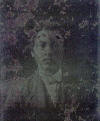 Picture N: c. 1875; Joan and I think this suit and hairstyle are similar
to Photo “J”;
Picture N: c. 1875; Joan and I think this suit and hairstyle are similar
to Photo “J”;